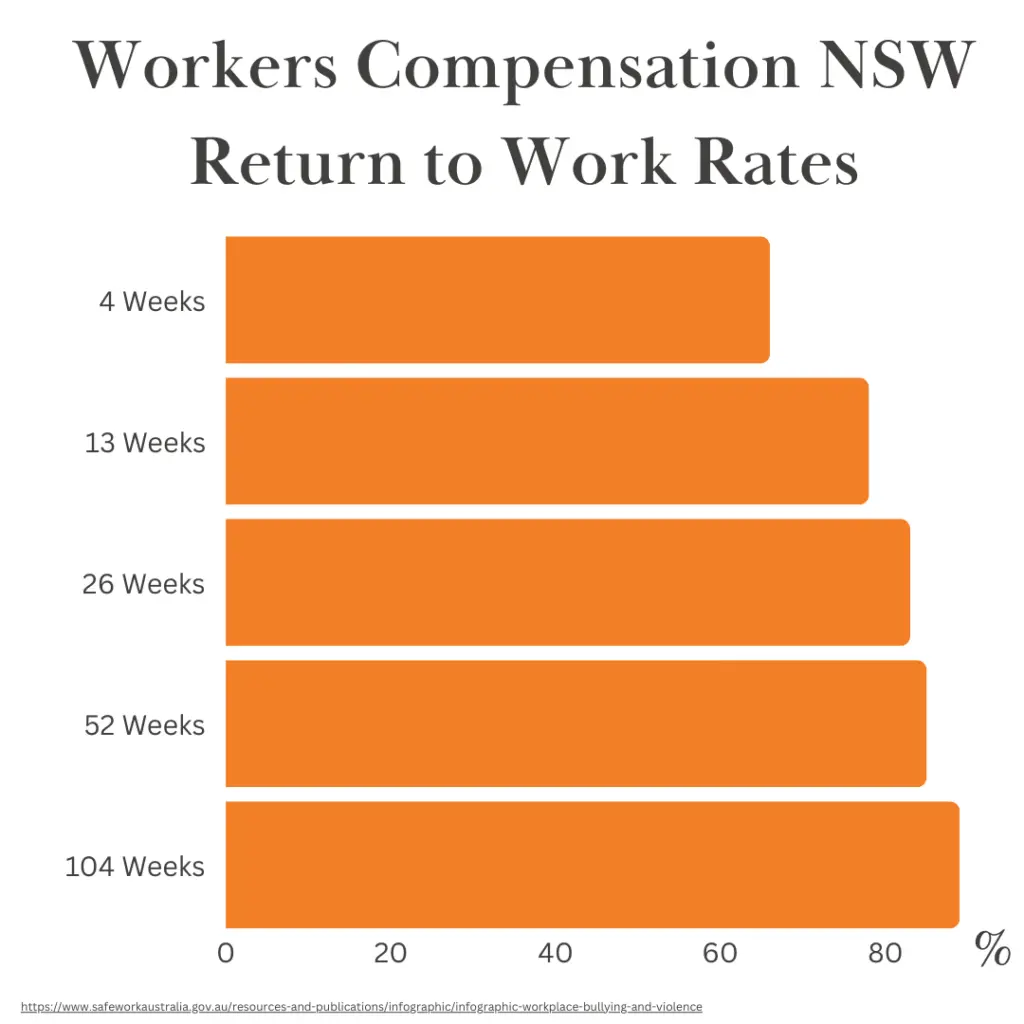Can an employee be terminated while on workers compensation in NSW? The short answer is yes.
While your employer may terminate you, it is not legal for them to do so within six (6) months of your injury, purely because you’re unfit to return to work. This period is called the ‘protected period’.

After 6 months however, it is legal for your employer to terminate you, provided they have facilitated all things possible to assist you to return to work.
If you are terminated however, you may have options to seek reinstatement.

Common Injuries Eligible for Workers Compensation in NSW
To qualify for workers compensation in NSW, your injury must occur during the course of your employment. Eligible injuries include:
- Physical Injuries: Such as fractures, sprains, or repetitive strain injuries.
- Psychological Injuries: Including work-related stress, anxiety, or depression.
- Occupational Diseases: Conditions caused by workplace exposure, like asbestosis.
- Aggravation of Pre-Existing Conditions: If worsened by work-related activities.
If you’ve experienced any of these injuries at work, you may be eligible to claim workers compensation benefits. If you are unsure if you injury qualifies, or if you are unsure of your entitlements, contact our team of experienced workers compensation lawyers today for a free claim assessment.
Your Employer’s Responsibilities While You’re on Workers Compensation
- Participating in the development of the your injury management plan.
- Complying with their obligations set out in the injury management plan.
- Providing you with suitable work where reasonably practicable, when you’re able to return to work, either on a full-time or part-time basis, with or without restrictions.
- Providing you with suitable work that is, where reasonably practicable, the same as or equivalent to the work you performed at the time of your injury.
- The physical demands of each task.
- The impacts of your injury, and any medication you may be taking on your ability to manage the psychological, cognitive, and social demands of the duties being offered.
- Whether the environment you are returning to is appropriate, considering confined spaces, seating arrangements, uneven surfaces and working alone and whether these would impact on your ability to undertake specific tasks.
- Elimination or substitution of tasks to reduce the risk of further injury to you.
- If the duties identified fall outside what would be considered your usual duties, then whether you require further education or training to complete the duties safely.
- How your personal circumstances influence your recovery at work. For example, if your employer were to relocate you, they should consider where you live and whether this creates difficulty getting to and from work.
- Whether the duties add value to the workplace. If the duties do not add value, you may become unmotivated or discontent.

Terminating an Employee on Workers Compensation in NSW: What Happens to Your Entitlements?
If your employer terminates your employment while you’re on workers compensation, they must follow specific legal requirements, including:
Providing Written Notice:
Your employer must issue written notice of termination.Honoring Your Minimum Notice Period:
They must provide the required notice period under your employment agreement or the Fair Work Act.Paying in Lieu of Notice:
Your employer may choose to pay you instead of requiring you to serve the notice period.Combination of Notice and Payment:
They can also combine written notice with payment in lieu of the remaining notice period.
Your Entitlements After Termination
Even if you’re dismissed because your GP certifies you as unfit for work, your workers compensation benefits do not end. Here’s how it works:
If You’re Fully Unfit for Work:
You remain eligible for:- Weekly payments to replace lost wages.
- Coverage for reasonably necessary medical treatment.
These benefits will continue during your entitlement period.
If You’re Fit for Suitable Duties:
If your GP certifies you as fit for modified or suitable duties but not pre-injury duties, you’ll receive:- Pro-rated weekly payments based on your capacity to work.
- Medical treatment within your entitlement period.
Who Pays Your Benefits After Termination?
When your employment officially ends (e.g., resignation or dismissal), your weekly payments will no longer come from your employer. Instead, the workers compensation insurer will take over responsibility for paying your benefits directly.


Can I Resign While Receiving Workers Compensation in NSW?
Yes, you can resign from your job while receiving workers compensation benefits, as long as you provide the required notice period to your employer. In most cases, your workers compensation period can count as your notice period.
However, resigning while on workers compensation is a significant decision and may not always be in your best interest. In some situations, resigning could impact your ongoing claim or entitlements, and your employer or insurer may use it against you. We recommend you speak to our team of workers compensation lawyers for free advice on how this could impact your claim.
Can Your Employment Be Reinstated After Being Terminated While on Workers Compensation in NSW?
If your employer has terminated your employment due to your injury, you may seek reinstatement of your employment when you’re certified by your GP as fit to return to pre-injury duties. Provided it has not been more than two years since your dismissal, you can seek reinstatement:

Speak to your employer about reinstatement. If not to your pre-injury role, to one that is not less advantageous than your pre-injury role.

If your employer is unwilling to reinstate you, you need to apply to the Industrial Relations Commission (IRC) for a reinstatement order.
What to Do if You’re Facing Termination on Workers Compensation
If you believe your termination was unfair or unlawful, take the following steps:
Seek Legal Advice:
Contact our experienced team of workers compensation lawyers to assess your situation and protect your rights.Lodge a Complaint:
You may be able to file a complaint with the Fair Work Commission for unfair dismissal or discrimination.Continue Your Claim:
Even if terminated, you may still be eligible for medical benefits, weekly payments, or lump-sum compensation under NSW workers compensation laws. Our team of workers compensation lawyers can help you claim your entitlements on a No Win No Fee basis.Losing your job while on workers compensation can be overwhelming, but you don’t have to face it alone. Taking swift action and seeking the right legal support can make all the difference. Withstand Lawyers are here to guide you through this process and fight for the compensation and justice you deserve. Contact us today for a free consultation.
Can You Claim Workers' Compensation After Resignation?
A common question that employees have is “Can I claim workcover after resignation?”. The answer is yes, you can claim workers’ compensation after resignation.
Under NSW law you may still lodge a workers compensation claim after resigning. In most cases, you have up to 6 months from the date of your injury to make a claim, whether you are still employed or not.
However, resigning can impact your claim, especially when it comes to entitlements like weekly payments. Before making any decisions, it’s best to consult with our experienced workers compensation lawyers to understand how resignation may affect your rights and benefits.
How Long Can You Stay on Workers' Compensation in NSW?
In New South Wales (NSW), injured workers can receive weekly compensation payments for up to 260 weeks (5 years) if their whole person impairment (WPI) is assessed at less than 21%.
If your WPI is 21% or higher, you may be eligible for ongoing payments beyond the 5-year limit. Your entitlement depends on medical assessments and your capacity to work.
Click here to read more about the duration of workers compensation entitlements, or contact our dedicated team of workers compensation lawyers today for a free claim assessment.

Why Choose Withstand Lawyers for Your Workers Compensation Claim?
At Withstand Lawyers, we are committed to providing compassionate, expert legal assistance to help you navigate your workers compensation claim with confidence. Here’s why we are the trusted choice for clients across NSW:
1. No Win, No Fee Guarantee
Our firm operates on a strict No Win, No Fee basis, meaning you won’t pay us anything unless your claim is successful.
2. No Out-of-Pocket Expenses
Thanks to funding from the Independent Review Office (IRO), all legal fees and associated costs are covered, ensuring there are absolutely no costs to you.
3. Decades of Experience
With years of proven expertise in workers compensation law, our team has helped countless clients achieve favorable outcomes in even the most complex cases.
4. Free Claim Assessment
We offer a free, no obligation assessment of your case, so you can understand your options and make informed decisions with no pressure.
5. Clear, Simple Communication
Legal jargon can be overwhelming. We explain everything in straightforward terms, so you fully understand your rights, entitlements, and the claims process every step of the way.
When you choose Withstand Lawyers, you’re choosing a dedicated team that puts your needs first. Contact us today to start your claim with confidence and peace of mind.

Issa Rabaya
• Bachelor of Laws
• Graduate Diploma in Legal Practice
• Approved Legal Service Provider to the Independent Review Office
• Member of the Law Society

Issa Rabaya
• Bachelor of Laws
• Graduate Diploma in Legal Practice
• Approved Legal Service Provider to the Independent Review Office
• Member of the Law Society




